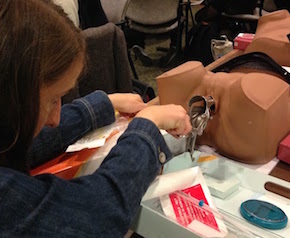Hands-on-Training
Despite compelling evidence about the safety and efficacy of the IUD and the contraceptive implant, there are many barriers to increasing access to long-acting reversible contraception (LARC). These barriers include commonly held myths about the methods, up-front costs of purchasing the methods, and a shortage of primary care providers competently trained to insert and remove LARC.
LARC insertion and removal skills are relatively simple procedures to learn, but, unfortunately, training options for community clinicians are nearly non-existent. Developing cost-effective, replicable models for training clinicians in LARC insertion and removal would address a critical barrier to LARC access.
In September 2014, in collaboration with a large community health center in New York City, the Reproductive Health Access Project launched a pilot project to train community clinicians to providing LARC. We had to work out a lot of logistical issues before we could launch training. One of the most complicated issues we had to address was ensuring medical liability coverage for the trainees – and we came up with a workable solution!
Our training program consists of a six-session training curriculum that contains didactic, simulation, and hands-on teaching. We evaluate our trainees every step of the way and also provide them with tools to assess readiness for providing LARC in their practice and a start-up resource guide to help them set up the systems they’ll need to provide this care to their patients.
As of March 2016 we have trained 25 community-based clinicians in LARC insertion and removal. Our evaluation findings so far indicate that almost half (45.5%) of the trainees had no prior experience inserting IUDs, more than half (61.5%) had no prior experience inserting contraceptive implants, and most trainees (63.6%) had little to no experience performing speculum (or reproductive health) exams. So far, 95% of the trainees successfully completed the training program and are ready to provide LARC to their patients.
Our pilot demonstrates that intensive, short-term clinical training can provide community clinicians, even those with very limited reproductive health care experience, the skills to safely and effectively provide IUD and contraceptive implants.
Next steps? Replicating our model!

